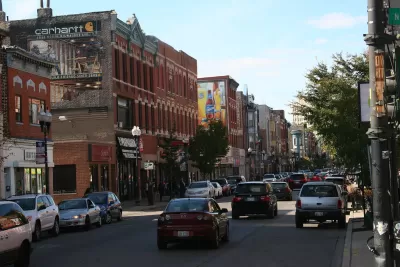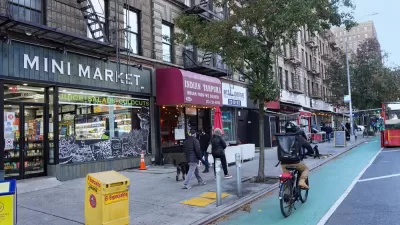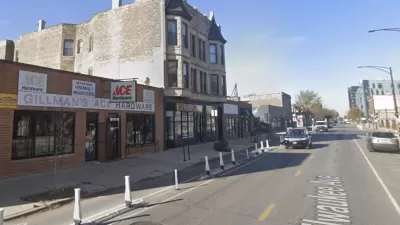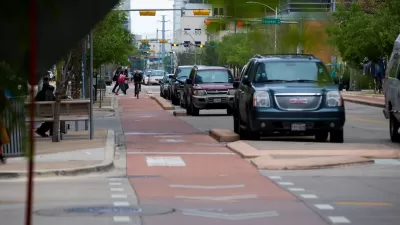With car parking banned from two blocks of Chicago's Milwaukee Avenue on weekend nights, the city could take the opportunity to permanently adapt the space for other uses.

After complaints from neighbors about illegal street drinking and after-hours noise on a popular strip of Chicago's Wicker Park neighborhood, the city banned parking on the 1400 and 1500 blocks of Milwaukee Avenue on weekend nights. But now, as John Greenfield reports, some business owners say "not only do empty parking lanes make the corridor look more desolate, they also encourage motorists to speed in the travel lanes, or even drive in the parking lanes, which is particularly dangerous for people cycling in the dashed bike lanes on Milwaukee."
Greenfield argues that the city should do more to support the retrofitting of curbside parking into outdoor seating and dining areas, and that these efforts should include shoring up bus service in popular commercial areas and installing protected bike lanes in former parking lanes.
While some local business owners expressed concern about losing parking when a protected bike lane was first proposed in 2017, Greenfield writes that "it sounds like removing all of the car parking on Milwaukee during prime bar-going hours hasn’t actually been devastating to local businesses, but instead has been a minor inconvenience. That’s evidence that converting only half of the spaces for protected lanes at all times wouldn’t cause major problems either, but would instead make it safer and easier for customers to bike to their establishments."
FULL STORY: Banning parking as a public safety strategy? Use the space for walking, biking, or dining

Planetizen Federal Action Tracker
A weekly monitor of how Trump’s orders and actions are impacting planners and planning in America.

Congressman Proposes Bill to Rename DC Metro “Trump Train”
The Make Autorail Great Again Act would withhold federal funding to the system until the Washington Metropolitan Area Transit Authority (WMATA), rebrands as the Washington Metropolitan Authority for Greater Access (WMAGA).

The Simple Legislative Tool Transforming Vacant Downtowns
In California, Michigan and Georgia, an easy win is bringing dollars — and delight — back to city centers.

The States Losing Rural Delivery Rooms at an Alarming Pace
In some states, as few as 9% of rural hospitals still deliver babies. As a result, rising pre-term births, no adequate pre-term care and "harrowing" close calls are a growing reality.

The Small South Asian Republic Going all in on EVs
Thanks to one simple policy change less than five years ago, 65% of new cars in this Himalayan country are now electric.

DC Backpedals on Bike Lane Protection, Swaps Barriers for Paint
Citing aesthetic concerns, the city is removing the concrete barriers and flexposts that once separated Arizona Avenue cyclists from motor vehicles.
Urban Design for Planners 1: Software Tools
This six-course series explores essential urban design concepts using open source software and equips planners with the tools they need to participate fully in the urban design process.
Planning for Universal Design
Learn the tools for implementing Universal Design in planning regulations.
Smith Gee Studio
City of Charlotte
City of Camden Redevelopment Agency
City of Astoria
Transportation Research & Education Center (TREC) at Portland State University
US High Speed Rail Association
City of Camden Redevelopment Agency
Municipality of Princeton (NJ)





























